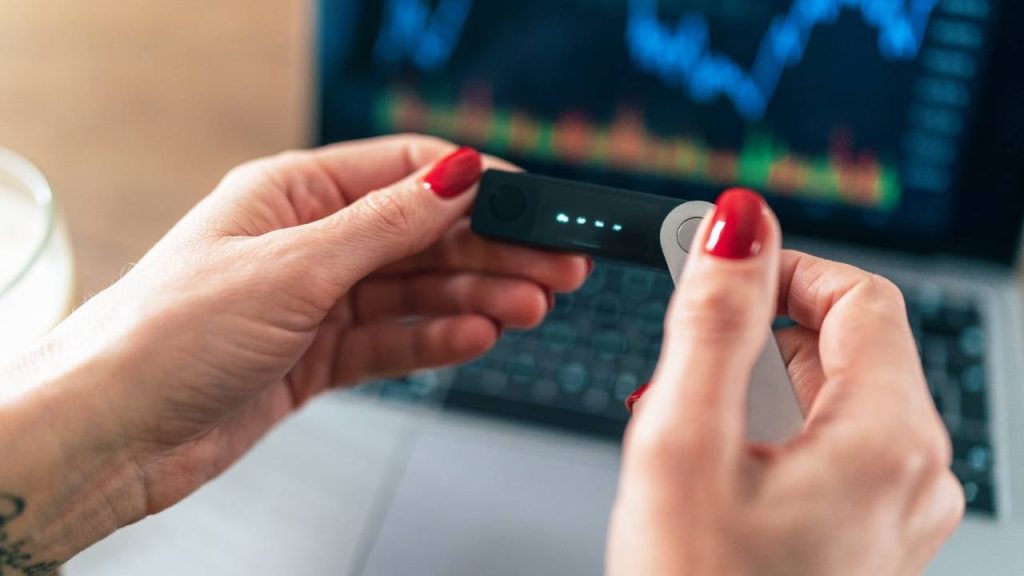Our writers and editors used an in-house natural language generation platform to assist with portions of this article, allowing them to focus on adding information that is uniquely helpful. The article was reviewed, fact-checked and edited by our editorial staff prior to publication.
A cryptocurrency wallet is a place to store your keys to cryptocurrency such as Bitcoin, Ethereum or one of the many thousands of others. Like a physical wallet, a digital crypto wallet provides a place to safeguard your currency and a means to access it when you want to use it.
Here’s how crypto wallets work and the key things you need to know about digital wallets.
What is a cryptocurrency wallet?
A cryptocurrency wallet is a place to hold transaction keys to your cryptocurrency, either online or on a physical device. Since virtual currency exists only in the decentralized crypto network that manages and tracks it, your crypto wallet must be able to interact with that network, too.
While pros say “wallet” to describe what safeguards your cryptocurrency, it’s more accurate to think of it as holding keys to a virtual address where your holdings are attributed. In any crypto’s distributed ledger — the running receipt of every transaction in the currency — the wallet tells the networked system that any crypto sent to this address belongs to the owner of this wallet.
In effect, you can’t transact in crypto without some kind of digital wallet. You simply have to have a place that indicates its ownership, unlike physical dollar bills, which could literally just be floating around. So any place that offers the ability to trade crypto — for example, exchanges such as Coinbase and payment apps such as CashApp and PayPal — have a basic wallet, though they may not offer the most secure wallets or other specialized features.
That said, if you buy crypto through a broker you may not be able to actually hold it yourself, what enthusiasts call “self-custodying.” A brokerage such as Robinhood or Webull will hold it until you’re ready to sell it, and you will not be able to move it “off-chain” in your own digital wallet or otherwise transact in the cryptocurrency. You’ll have to convert it to dollars before spending it.
Generally, if the brokerage or crypto exchange has custody of the asset, then it has the responsibility of maintaining it. If you move your crypto to a wallet, you may be solely in charge of safeguarding your coins. So if you lose your access keys (your wallet), you may lose your cryptocurrency.
Why crypto wallets are useful
Crypto wallets provide a variety of advantages, though not without some drawbacks:
Advantages of crypto wallets
- Ability to transact: A digital wallet allows you to collect payments from others and acts as a place to store your payment keys so you can pay others. It may feel like payment apps such as CashApp, PayPal or Venmo, which you may use for regular currency.
- Can take custody of coins: With wallets you can “self-custody” coins, taking them from an exchange and holding them yourself, sometimes using a physical device that can be disconnected from the internet, creating potentially greater protection from hacking.
- May have greater security: More advanced wallets may offer greater security and specialized features than a wallet provided with a payment app. A personal digital wallet may be controlled by the user and so is not exposed to the large-scale threats such as hacking or even outright fraud from a crypto exchange that could steal clients’ holdings.
This setup means that you alone may be responsible for safeguarding your crypto holdings. For many people, this feature is an advantage since you don’t have to rely on a third party. However, this setup also exposes crypto holders to the serious risk of losing the wallet — and their keys.
Disadvantages of crypto wallets
- Subject to theft or loss: Just like a real-life wallet, if you drop a digital wallet or it’s stolen, you may lose whatever was in it. So you could lose a physical crypto wallet or simply lose the wallet’s password, and you lose the crypto tied to the wallet. That said, some services may help you recover lost passwords.
- Subject to destruction or degradation: A physical wallet may be subject to degradation of the data on it or even destruction by some other means.
- May make it harder to use crypto: Some wallets are meant to be like Fort Knox — impenetrable — but that makes them harder to use for transactions, when you need to connect with others. And some wallets may not be usable with certain types of coins. Other types of wallets, typically software wallets, are made for usability but are generally less secure. So security and usability may be at odds with one another here.
Are crypto wallets secure?
Generally, crypto wallets are secure, but different types of wallets may be more secure than others. Hardware wallets, which allow you to disconnect from all electronic interactions, offer the safest alternative, while software wallets make crypto more usable for transactions.
But software wallets are only as good as their programming, and hackers are always looking for weak points in the security at brokers and crypto exchanges. So the protection offered by software wallets depends heavily on the quality of the wallet itself.
Beyond this issue, however, is that fraudsters are also looking for ways to rip off people through “human engineering.” That is, they may try to get wallet owners to download viruses or make erroneous decisions, given the novelty of crypto technology and the ignorance or greed of users.
No crypto wallet in the world can protect you from giving away your assets, either accidentally or through the deceit of the bad guys.
Do you need a wallet for cryptocurrency?
If you intend to transact in cryptocurrency, you’ll need a wallet. Places where you can transact in cryptocurrency typically provide you a payment app that can do the basics. So you’ll be able to send payments to others and receive payments from them.
Similarly, if you intend to self-custody, including taking your coins “off chain,” then you’ll need a wallet to do so. Some people use a hardware wallet (more below) to reduce the risk of hacking.
If you intend to only trade cryptocurrency, you won’t need a wallet to hold it. The exchange or broker will hold it on your behalf, and then when you’re ready to trade it, you can place your order.
Types of crypto wallets
Generally, crypto wallets come in two categories: hardware wallets, or cold wallets, and software wallets, or hot wallets. The best crypto wallets offer a variety of features.
Cold wallets vs. hot wallets
A cold wallet is one that typically relies on a physical device — hardware — to safeguard your digital currency. It may look something like a USB thumb drive with the specialized functions to manage and hold your coins. It holds your cryptocurrency keys that let you transact in the currency and own it. When you need to transact, you can plug in your wallet and move money.
The key advantage of this wallet — what makes it “cold” — is that it can be disconnected from the internet. Because it can be disconnected, your cryptocurrency is not easily subject to electronic theft. Of course, they’re still subject to other kinds of loss, including the misplacement of the physical wallet, physical theft or damage of the device and the loss of the device’s password.
So hardware wallets are designed for safekeeping of crypto assets and less for transactions.
In contrast, a hot wallet is one that you can use to transact in cryptocurrency readily, and typically uses software to safeguard your holdings. The point of the hot wallet is to make crypto easy to use, and the trade-off is that hot wallets may be less safe than hardware wallets.
Software wallets are less secure than hardware wallets because they’re connected to the internet, exposing them to potential hacking. Because of this concern, you might want to hold only what you intend to spend in a hot wallet, as you would for a physical wallet.
Hot wallets comes in a few different types, depending on how exactly you access them:
- Desktop wallets: You can download software to your computer and manage your crypto holdings from there. This wallet strikes a balance between security and ease of use, allowing you to transact in crypto from your wallet but go offline when you’re not using it.
- Web wallets: A web wallet is often a software plug-in for your web browser that can connect to a crypto’s blockchain to make a transaction. You can jump on and off to make a transaction, but the connection to the internet makes it less secure than a cold wallet.
- Mobile wallets: A mobile wallet is an effective solution for your mobile device, often with the goal of paying someone for goods or services.
Some cold wallets and hot wallets may be integrated so that you have one solution for both, making it easier to use both types of wallets in a format you’re familiar and comfortable with.
Paper wallets
One other type of wallet promises a high degree of safety at the cost of usability: a paper wallet. With a paper wallet you print your crypto access keys and have access to them only in a physical form. Your keys are removed from your digital wallet and the network, providing a high level of safety from electronic hacking and theft.
The downside to paper wallets is that your access to crypto relies on you safely holding on to the sheet of paper with the keys. Lose it, and you’re in some trouble.
What is the safest type of crypto wallet?
The safest type of crypto wallet depends on what you’re trying to protect against. Each kind of wallet exposes you to different risks, even as it protects against some risks.
For example, if you’re trying to safeguard against online hacking, it may make sense to go with a hardware wallet, particularly if you don’t intend to transact with your crypto. But it exposes you to other risks: losing your keys if they’re written down or the loss or theft of the physical device.
Software wallets rely on the security of the app itself to protect against theft, but its connection to the internet may expose the wallet to extra risks, relative to a hardware wallet that can be disconnected. Still, the risk may be minimal overall and be worth it if you plan to transact.
Of course, you can split the difference here, just as you would in the real world. You don’t go walking around with your whole net worth in your physical wallet. You keep most of your assets in a secure place — a bank, for example — and go out only with what you need. Similarly, you can keep most of your crypto in a hardware wallet while your pocket money is in a software wallet.
How to get a crypto wallet
As you’re considering what kind of wallet to get, you’ll want to think about the following factors:
- Your needs: What is your goal with your crypto wallet? Do you need to transact regularly or are you fine simply holding cryptocurrency as you wait for it to appreciate? If you intend to use crypto, a hot wallet is a better option, while a cold wallet is better for those who are mainly planning to hold their crypto. Of course, you can split the difference, too.
- Cost: A hardware wallet may cost between $60 and $120. Software wallets are often free to download or are provided as a free feature at top crypto exchanges, but may charge a per-transaction fee.
- Support for certain currencies: You’ll want to check to see that a wallet supports the crypto coins you intend to hold or transact in. Bitcoin is the largest and most typical, of course, but less popular coins may not be supported.
- Convenience: If you’re using a wallet, you’ll want to be sure that it’s easy to use.
- Features: Check out wallets to make sure they have any other features that you’re looking for, besides just support for specific currencies. For example, if you’re using both software and hardware wallets, see if they integrate well with one another.
The best crypto wallet for you is the one that offers the features that you need, not necessarily the one that scores highest on objective measures.
Read the full article here










